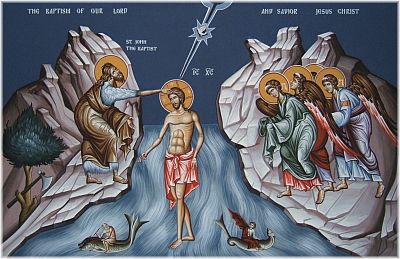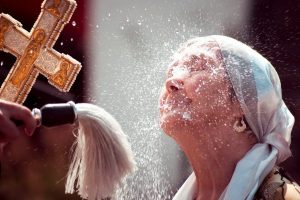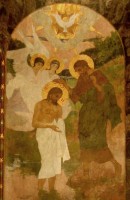The word Baptism comes, to no surprise, from Greek: baptisma, meaning immersion into water. So baptism is linked with water by definition. It is the general understanding that through the baptism the person that is baptized is receiving a blessing. In Christ case however the things are different. John’s baptism was a baptism of repentance for the remission of sins, but Christ had no sin. Here is what a troparion form the Orthros service of the feast says:
Christ is baptized with us, even though He is above all purity; and thus He infuses sanctification into the water, which then becomes the purifying agent of our souls.
Through the baptism of the Lord the waters received God’s blessing, being transformed in waters of sanctification. The Jordan is no more a water in which the demons lurk, as we see sometimes in the icons of Theophany, but it is now water of salvation; water that liberates man from the ties of sin, giving Him birth again from water and Spirit. Man is remodeled by God, as a pot maker models his vessels, using water and fire: water from the River Jordan and fire from the Holy Spirit.
On this day the River Jordan changes its course, and starts flowing backwards, underlying exactly this concept. The river Jordan, with its two traditional streams Jor and Dan represents also our lives, lives that flow from our ancient parents, Adam and Eve. From them the life of mankind started flowing toward the Dead Sea of sin and perdition, as Jordan River does. But when the Master entered the river, the Jordan started flowing backwards, in the same way as our lives turn toward our true godly origins when Christ enters into our lives.

The events on the banks of Jordan uncovers the deep meanings of the Sacrament of Baptism in Christian practice. During the sacrament we sing “as many as were baptized in Christ have put on Christ”. This reveals the mystical presence of Christ at our baptism. When we enter into the baptismal font Christ is also there with us turning around the course of our lives from a life spent in sin and worldly things into a life in virtue, and heavenly glory.
In remembrance of this divine episode we also perform the blessing of the waters in the day of Epiphany. St. Basil the Great affirms that the blessing of water came to us as a “mystical tradition” and that the water, through the prayer and blessing of the priest, receives a “quickening power of the Holy Spirit.” Through this heavenly power the water we bless today receives the power to bless those who drink from it or are sprinkled with it and lasts for years without corruption.
It is a custom among our people to drink of the Holy Water for the “purification of their souls and bodies and cure of our weakness.” This custom is very ancient and came to us with the ritual itself. The taking of the Holy Water to our homes is to have it as a life-giving fount of continued blessings and protection against all evil.
It is a miracle of God still happening in our times. We just have to open our eyes and accept the power of the Holy spirit into our lives and through repentance go away from the salty and deadly sea of errors and rejoin our sweet origins in paradise, glorifying the Holy Trinity who was reveled to us today, Father, Son and Holy Spirit.



















